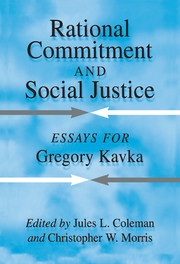Book contents
- Frontmatter
- Contents
- Acknowledgments
- List of Contributors
- Introduction: The Moral and Political Philosophy of Gregory Kavka
- Some Personal Memories
- The Shadow of the Future
- A New Paradox of Deterrence
- Rethinking the Toxin Puzzle
- Toxin, Temptation, and the Stability of Intention
- The Toxin Puzzle
- Religion and Morality in Hobbes
- Contemporary Uses of Hobbes's Political Philosophy
- The Knavish Humean
- Some Considerations in Favor of Contractualism
- Justice, Reasons, and Moral Standing
- Wrongful Life: Paradoxes in the Morality of Causing People to Exist
- Gregory S. Kavka's Writings
A New Paradox of Deterrence
Published online by Cambridge University Press: 28 October 2009
- Frontmatter
- Contents
- Acknowledgments
- List of Contributors
- Introduction: The Moral and Political Philosophy of Gregory Kavka
- Some Personal Memories
- The Shadow of the Future
- A New Paradox of Deterrence
- Rethinking the Toxin Puzzle
- Toxin, Temptation, and the Stability of Intention
- The Toxin Puzzle
- Religion and Morality in Hobbes
- Contemporary Uses of Hobbes's Political Philosophy
- The Knavish Humean
- Some Considerations in Favor of Contractualism
- Justice, Reasons, and Moral Standing
- Wrongful Life: Paradoxes in the Morality of Causing People to Exist
- Gregory S. Kavka's Writings
Summary
Some years ago, in what has since become a widely known and highly regarded essay, Gregory Kavka articulated what he called three “paradoxes of deterrence.” In brief, he claimed to have identified three quite plausible and eminently defensible moral claims, each of which, he argued, was logically inconsistent with some other very appealing moral claim; and he maintained, further, that what was to be learned from his reflections was that the latter three claims, though widely accepted by both philosophers and ordinary people, were not strictly (i.e., universally) true. Showing this was particularly important, Kavka felt, because the claims whose truth he wanted to call into question actually functioned, in many moral systems, as critically important “bridge principles” that were supposed to enable us to understand the connection, in a given system, between principles for morally assessing human actions and principles for morally assessing human agents and their psychological states.
I have discussed this famous essay at length elsewhere, trying to show in what respects I think Kavka was right in what he argued there and in what respects he may be wrong. In addition, I have tried to show, in a number of other essays, the implications, both for moral theory and for certain other areas of philosophy, of those parts of Kavka's doctrine that seem to me to be true.
- Type
- Chapter
- Information
- Rational Commitment and Social JusticeEssays for Gregory Kavka, pp. 22 - 46Publisher: Cambridge University PressPrint publication year: 1998
- 1
- Cited by



